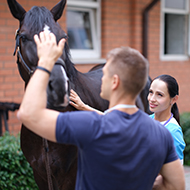Final call for international equine scholarship

"I am delighted that the RVC is able to support this transatlantic initiative for veterinary graduates" - Professor Richard Bomphrey, interim vice principal at the RVC.
The Royal Veterinary College (RVC) and the University of Pennsylvania's School of Veterinary Medicine (Penn Vet) have issued a reminder that the deadline for applications to the MARS EQUESTRIAN Equine Research Scholarship Programme is 15 March 2022.
The scholarship programme, which provides one person the unique opportunity to conduct research alongside renowned veterinary researchers, aims to advance the health and welfare of horses.
Taking place in both London and Pennsylvania over the course of the programme, the successful applicant will pursue the Graduate Certificate in Animal Welfare and Behaviour at Penn Vet over the course of the first year, and the Master of Research (MRes) programme at the RVC in the second year.
Open to UK, US and international candidates holding a veterinary degree, the scholarship programme begins in September 2022 in the United States, and then moves to the UK in October 2023.
Dr Kyla Ortved, Jacques Jenny Endowed term chair in orthopedic surgery and assistant professor of large animal surgery at Penn Vet, and primary mentor for the research project, said: “There are two fundamental components to a successful career in the veterinary medicine field: exceptional mentorship and the continuous pursuit of applicable knowledge.
“The multidisciplinary approach of the MARS EQUESTRIAN Veterinary Research Scholar Programme is set to provide both of these cardinal elements through an experiential learning environment that will ultimately culminate in delivering meaningful advancements that will have a very real, positive impact on the lives of our equine partners.”
Applicants should submit a CV and letter of intent to Dr Kyla Ortved at kortved@vet.upenn.edu by the 15 March 2022 deadline, and potential applicants can find out more about the programme here.



 The Animal and Plant Health Agency (APHA) has updated its online reporting service for dead wild birds.
The Animal and Plant Health Agency (APHA) has updated its online reporting service for dead wild birds.